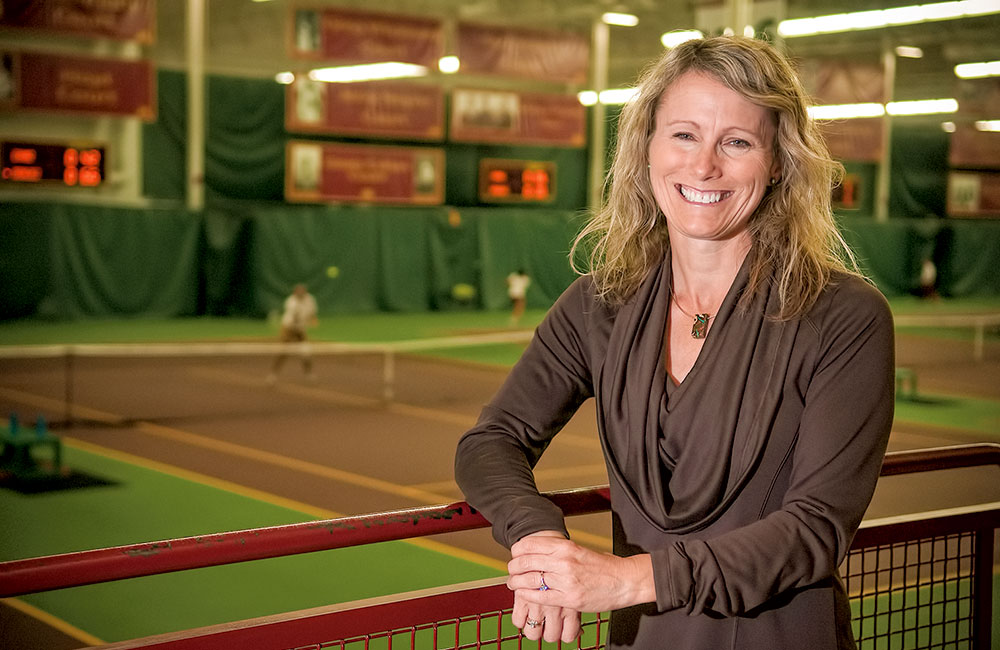In high school, Nicole M. LaVoi was a three-sport athlete in St. Cloud, Minnesota, playing year round—tennis, basketball, and softball. It was the 1970s, and sports were opening up to girls in a big way.
“Anything that was outdoors, I loved to play,” says LaVoi, who also played hockey. “I was on the front edge of those women who benefitted from Title IX.”
LaVoi played NCAA Division III tennis at Gustavus Adolphus College in St. Peter, where her team won the national championship in 1990 and she was twice named an NCAA Academic All-American. She was so busy competing she didn’t have time to think about what came next.
Cleaning up one day after workouts in spring semester of her senior year, she remembers racking her brain: “What can I do? What should I do?” LaVoi had spent many summers working with kids, teaching at camps—which she loved—and she kept coming back to that.
“I like to coach,” she told herself. “I like to work with young people.”
LaVoi grew up swearing she would never be a teacher, although her parents—who were teachers—encouraged it, so when she realized, “Yup, coaching is teaching,” it felt like giving in . . . but it was also a recognition of her strengths and passion. That day LaVoi decided, “I want to be a college tennis coach and teacher.”
From “sport person” to “gender-in-sport person”
LaVoi was hired as an assistant women’s tennis coach at nearby Carleton College and was soon pursuing her master’s in sport psychology at the University of Minnesota. In 1994 she landed a tenure-track job as an assistant professor and head women’s tennis coach at Wellesley College in Massachusetts.
“There I was, a Midwest kid at an elite East Coast school,” says LaVoi. “Wellesley is one of the Seven Sister colleges, and in that all-women’s environment, I could see the evolution and growth of young women by the time they graduated. Until then I was not a ‘gender’ person—I was a ‘sport’ person. It was a transformative experience for me, too.”
The transformation for LaVoi was happening at the same time as the Tucker Center for Research on Girls & Women in Sport was forming at the University of Minnesota.
“I realized my calling was to make an impact on a bigger stage,” she says. “I decided to go back to grad school. I followed my passion, and it’s always served me well.”
LaVoi landed a research position at the University of Notre Dame in 2002, where she also taught in the psychology department and helped to launch the Play Like a Champion series on character education through sport. But when the associate directorship of the Tucker Center was created in 2005, LaVoi was recruited and jumped at the chance to return to Minnesota.
Now she occupies an office in Cooke Hall with a window facing the Recreation Center and a little kidney-shaped conference table for Tucker Center meetings. Her favorite things are working with creative scholars like professor and Tucker Center director Mary Jo Kane, striving to make a difference as a public scholar, and interacting with great students.
“We recruit the best and brightest to work in the Tucker Center,” says LaVoi as student staff members jet in and out of adjacent offices.
Role of the coach
Teaching and training are a big part of LaVoi’s job. The undergraduate kinesiology core course, Sport in a Diverse Society, which she teaches every semester and summer, she describes as fun. She leads many coach workshops, such as one at the United States Professional Tennis Association’s World Conference in New Orleans this fall. And the grad course Psychology of Coaching fits closely with her outreach and research—“Coach education is a passion,” she says.
LaVoi is interested in the coach–athlete relationship as well as the barriers, supports, and resiliency experienced by female coaches. A paradox in athletics today is that, while the participation of girls and women has increased, the number of women coaches has actually declined to a nearly all-time low. That led to the Tucker Center publishing the Women and College Coaching Report Card: the fourth annual report card will come out in February.
“Many girls grow up never having one female coach in their whole career,” says LaVoi. “All boys grow up with same-sex role models and that’s good . . . . Girls need same-sex role models, too. Women and men need women as role models. We need gender diversity in our coaching staffs!”
One of the highlights of the past year was finishing her first book, Women and Sports Coaching, which will come out in 2016. When the publisher approached her with the idea for a book that would be the first of its kind, she already had an outline in her head and said yes. As editor, LaVoi chose authors around the world to write the chapters. She turned in the manuscript in September and already has another work in progress—an evidence-based book on the theme of the moral coach.
“We have some great coaches here at the U of M,” says LaVoi, and begins to rattle off a list of names.
While highly productive at work and on the go to conduct trainings and speak to organizations, LaVoi protects her time on evenings and weekends, when she plays golf and does a lot of hiking.
“I’m very strong on work–life balance,” she says. “It is so important to live and model that.”
Read more about Nicole LaVoi, the Tucker Center for Research on Girls & Women in Sport, and the School of Kinesiology.
Watch LaVoi’s May 2015 TEDx Talk, “Now You See Her, Now You Don’t.”
Story by Gayla Marty | October 2015
